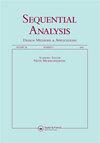二项早停时间
IF 0.6
4区 数学
Q4 STATISTICS & PROBABILITY
Sequential Analysis-Design Methods and Applications
Pub Date : 2021-10-02
DOI:10.1080/07474946.2021.2010409
引用次数: 0
摘要
摘要出于公共卫生、经济或其他原因必须尽快获得结果时,出于可能提前停止试验的目的进行的序列分析非常重要。自20世纪中期以来,一个主要的研究方向是将Wald的序列概率比检验(SPRT)推广到包括复合替代假设的挑战。本文通过在成功与失败的二维空间中使用生成函数自变量为零假设构建一个三角拒绝区域的单参数族,为二项式分布提供了一种替代方案。该结果在代数上等价于具有单位幂的SPRT的一行,并且以二项式参数的第二个值作为待定参数。然后四舍五入将线离散化为二维整数的网格,并使用任意停止条件的经典结果来给出二项式参数及其方差的估计器表达式。从业者可以根据他们的风险偏好进行选择,或者更正式地通过幂分析进行选择。给出了一个生态学研究的例子,其中需要快速的二元决策,并且必须将这种愿望与结果的稳健性进行权衡。本文章由计算机程序翻译,如有差异,请以英文原文为准。
Binomial early stopping times
Abstract Sequential analysis for the purposes of possibly stopping a trial early is important whenever a result must be obtained as quickly as possible for public health, economic, or other reasons. A dominant research stream since the middle of the 20th century has been the challenge of generalizing Wald’s sequential probability ratio test (SPRT) to include composite alternative hypotheses. This article offers an alternative for a binomial distribution by constructing a single-parameter family of triangular rejection regions for the null hypothesis using a generation function argument in the two-dimensional space of successes versus failures. The result is algebraically equivalent to one line of the SPRT with unit power and with the second value of the binomial parameter as the undetermined parameter. Rounding then discretizes the line to the grid of two-dimensional integers and classical results for arbitrary stopping conditions are used to give expressions for the estimator, of the binomial parameter and its variance The choice can be made by the practitioner in terms of their appetite for risk or more formally via a power analysis. An example is given of an ecological study where a quick binary decision was required and this desire had to be weighed against robustness of the results.
求助全文
通过发布文献求助,成功后即可免费获取论文全文。
去求助
来源期刊

Sequential Analysis-Design Methods and Applications
STATISTICS & PROBABILITY-
CiteScore
1.40
自引率
12.50%
发文量
20
期刊介绍:
The purpose of Sequential Analysis is to contribute to theoretical and applied aspects of sequential methodologies in all areas of statistical science. Published papers highlight the development of new and important sequential approaches.
Interdisciplinary articles that emphasize the methodology of practical value to applied researchers and statistical consultants are highly encouraged. Papers that cover contemporary areas of applications including animal abundance, bioequivalence, communication science, computer simulations, data mining, directional data, disease mapping, environmental sampling, genome, imaging, microarrays, networking, parallel processing, pest management, sonar detection, spatial statistics, tracking, and engineering are deemed especially important. Of particular value are expository review articles that critically synthesize broad-based statistical issues. Papers on case-studies are also considered. All papers are refereed.
 求助内容:
求助内容: 应助结果提醒方式:
应助结果提醒方式:


